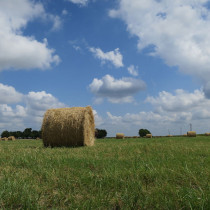YOUR TEXAS AGRICULTURE MINUTE
Protecting farm and ranch practices within city limits
By Gary Joiner
Publisher
Texas has a “right to farm” law that needs to be strengthened.
The Texas House Committee on Agriculture and Livestock is studying this interim the impact on agricultural operations of governmental and regulatory requirements and practices, including those that prevent or prohibit an activity that is a normally-accepted agricultural practice.
There’s a lot to talk about.
There are several examples in the Dallas-Fort Worth area where cities are using their public nuisance ordinances to prohibit agricultural activities. In one city, grass grown for hay is not allowed to grow taller than 12 inches without the city coming in and mowing the property and sending the bill to the farmer.
Hay bales in some cases must be removed from properties within a short period of time, usually 24-48 hours, to avoid penalties—all in order to comply with city health ordinances.
Some cities are arbitrarily requiring buffer zones of up to 250 feet around the property to be mowed short. That takes significant acreage out of production.
And the list goes on.
It’s imperative that farmers are given every opportunity to keep agricultural lands that are now inside the boundaries of cities due to urban sprawl in the production of commodities used to feed and clothe the world.
Common-sense changes to the state’s Agriculture Code are needed to preserve current “right to farm” statutory protections.
We need to ensure all agricultural operations are protected, not just those annexed after August 31, 1981.
The current law does not require a city to prove an agricultural practice is truly a threat to public health. The standard in current law needs to be strengthened.
Cities should be required to consult expert agricultural information on generally-accepted agricultural practices that are not a threat to public health. This would be similar to Central Appraisal Districts being required to consult the Comptroller’s agricultural use manual in assessing whether or not property should qualify for agricultural valuation.
Let’s hope the Texas Legislature takes action next year.
The preceding commentary is brought to you by Texas Farm Bureau, the “Voice of Texas Agriculture.” Called “Your Texas Agriculture Minute,” TFB will issue thought-provoking editorials each week—via print and audio—to spark understanding of agriculture in the Lone Star State and its impact on each and every Texan.
Media outlets: This content may be used without further permission.

